人教版五年级英语下册知识点
人教版五年级英语下全册重点和习题(经典版)
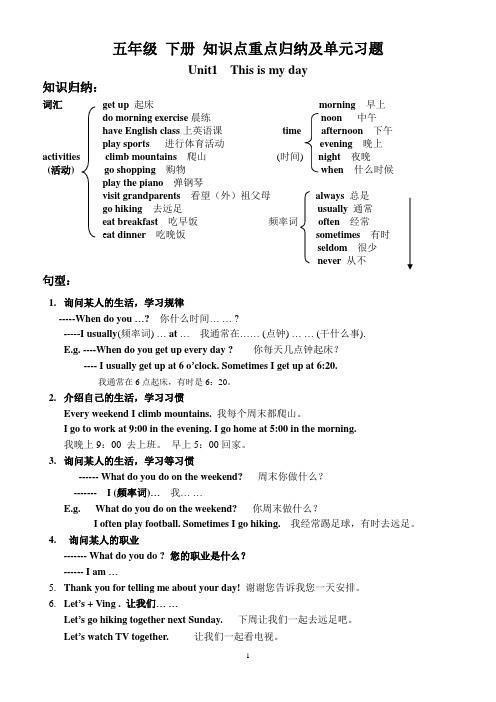
五年级下册知识点重点归纳及单元习题Unit1 This is my day知识归纳:词汇get up起床morning 早上do morning exercise晨练noon 中午have English class上英语课time afternoon 下午play sports 进行体育活动evening 晚上activities climb mountains 爬山(时间) night 夜晚(活动) go shopping 购物when 什么时候play the piano 弹钢琴visit grandparents 看望(外)祖父母always总是go hiking 去远足usually通常eat breakfast 吃早饭频率词often经常e at dinner 吃晚饭sometimes有时seldom很少never 从不句型:1.询问某人的生活,学习规律-----When do you …? 你什么时间…… ?-----I usually(频率词) …at…我通常在…… (点钟) …… (干什么事).E.g. ----When do you get up every day ? 你每天几点钟起床?---- I usually get up at 6 o’clock. Sometimes I get up at 6:20.我通常在6点起床,有时是6:20。
2.介绍自己的生活,学习习惯Every weekend I climb mountains. 我每个周末都爬山。
I go to work at 9:00 in the evening. I go home at 5:00 in the morning.我晚上9:00 去上班。
早上5:00回家。
3.询问某人的生活,学习等习惯------ What do you do on the weekend?周末你做什么?------- I (频率词)…我……E.g. What do you do on the weekend? 你周末做什么?I often play football. Sometimes I go hiking. 我经常踢足球,有时去远足。
人教版小学英语五年级下册各单元知识点

人教版小学英语五年级下册各单元知识点Unit 1 At the zooVocabulary1.zoo 动物园2.cage 笼子3.lion 狮子4.elephant 大象5.giraffe 长颈鹿6.bear 熊7.monkey 猴子8.camel 骆驼9.kangaroo 袋鼠10.penguin 企鹅Sentence patterns1.询问动物去哪里了 Where is the lion/elephant/bear?2.描述动物在哪里There’s a lion/elephant/bear in the cage.3.描述动物是什么样的 What does the lion/elephant/bear look like?4.描述动物在做什么 The monkey is jumping./The camel is walking. Unit 2 My school dayVocabulary1.school day 学校日2.subject 学科3.math 数学4.English 英语5.science 科学6.PE 体育7.art 美术8.music 音乐9.Chinese 语文Sentence patterns1.询问你有哪些学科 What subjects do you have?2.询问你最喜欢的学科是什么What’s your favorite subject?3.描述你正在上什么学科I’m having math/English/science class now.4.询问你在哪个班级 What class are you in?Unit 3 At a partyVocabulary1.party 派对2.balloon 气球3.present 礼物4.birthday 生日5.cake 蛋糕6.candle 蜡烛7.card 卡片Sentence patterns1.询问你们在庆祝什么 What are you celebrating?2.询问你送了什么礼物 What present did you bring?3.描述蛋糕上有多少个蜡烛 There are four candles on the cake.4.描述你在派对上吃了什么 I ate cake and drank soda.Unit 4 My clothesVocabulary1.clothes 衣服2.jacket 夹克衫3.shirt 衬衫4.dress 连衣裙5.skirt 短裙6.pants 裤子7.socks 袜子8.shoes 鞋子Sentence patterns1.询问你喜欢穿什么样的衣服 What clothes do you like to wear?2.询问今天你穿了什么衣服 What clothes are you wearing today?3.描述你的外套是什么样的 My jacket is blue.4.描述你的鞋子是什么颜色的 My shoes are red.Unit 5 My familyVocabulary1.family 家庭2.mother 母亲3.father 父亲4.sister 姐妹5.brother 兄弟6.grandmother 奶奶7.grandfather 爷爷8.aunt 阿姨9.uncle 叔叔Sentence patterns1.询问你有几口人家庭 How many people are there in your family?2.询问你和家人一起住吗 Do you live with your family?3.描述你的妈妈是什么样的 My mother is kind.4.描述你和兄弟姐妹的关系很好 My sister and I get along well.。
小学英语人教版PEP五年级下册1-6单元知识点总结

Unit1 My day一、基本句型1.询问什么时候做某事:- When do you ……?你什么时候……?- I usually…at …. 我通常在…(点钟)…。
例:-When do you eat breakfast?-I eat breakfast at 7:00.2.What do you do on the weekend?你周末做什么?- I +频率副词+周末活动+时间。
或Sometimes I+周末活动例句:I sometimes go shopping with my mum on the weekend.(周末我时候和妈妈一起去购物)二、知识点:1.频率副词:always(总是,一直)>usually(通常)>often(经常)>sometimes(有时)2.只有Sometimes可以放在句首。
(Sometimes I cook dinner.)3.On the weekend 在周末on Saturdays 在周六on Sundays在周日(别忘加s)Unit2 My favourite season1.-Which season do you like best? (你最喜欢哪个季节?)Why?(为什么)-I like +季节+ best.(I like spring∕summer∕fall∕winter best) Because ___________.(因为)或:-What‘s your favourite season? -My favourite season is spring∕summer∕fall∕winter.2.-Why do you like winter best?(你为什么最喜欢冬天?) -Because______.二、知识点:1.leaf(树叶):复数leaves2.W,W真神奇,问出许多大问题。
what,what,问“什么”,when,when,问“时间”,where,where,问“哪里”,which,which,“哪一个”,why,why,“为什么”.Unit3 My school calendar补充:1.Dragon Boat Festival 龙舟节或端午节(农历五月五日)一般在阳历6月2.月份首字母大写。
人教版小学五年级下册英语知识点整理
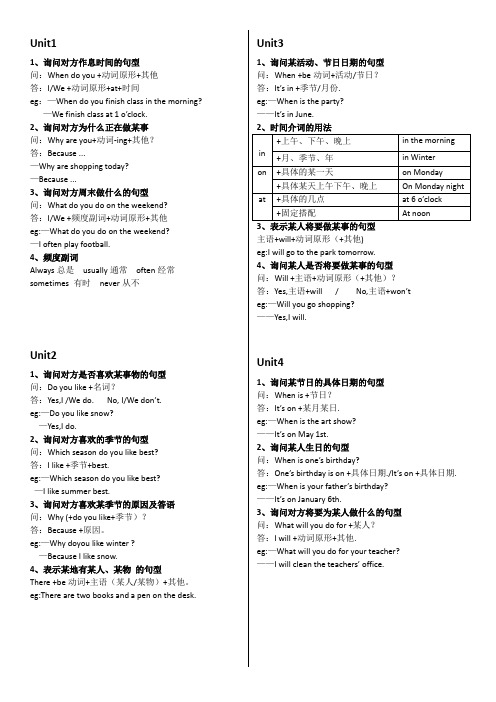
Unit11、询问对方作息时间的句型问:When do you +动词原形+其他答:I/We +动词原形+at+时间eg:—When do you finish class in the morning?—We finish class at 1 o’clock.2、询问对方为什么正在做某事问:Why are you+动词-ing+其他?答:Because ...—Why are shopping today?—Because ...3、询问对方周末做什么的句型问:What do you do on the weekend?答:I/We +频度副词+动词原形+其他eg:—What do you do on the weekend?—I often play football.4、频度副词Always总是usually通常often经常sometimes 有时never从不Unit21、询问对方是否喜欢某事物的句型问:Do you like +名词?答:Yes,I /We do. No, I/We don’t. eg:—Do you like snow?—Yes,I do.2、询问对方喜欢的季节的句型问:Which season do you like best?答:I like +季节+best.eg:—Which season do you like best?—I like summer best.3、询问对方喜欢某季节的原因及答语问:Why (+do you like+季节)?答:Because +原因。
eg:—Why doyou like winter ?—Because I like snow.4、表示某地有某人、某物的句型There +be动词+主语(某人/某物)+其他。
eg:There are two books and a pen on the desk.Unit31、询问某活动、节日日期的句型问:When +be动词+活动/节日?答:It’s in +季节/月份.eg:—When is the party?——It’s in June.主语+will+动词原形(+其他)eg:I will go to the park tomorrow.4、询问某人是否将要做某事的句型问:Will +主语+动词原形(+其他)?答:Yes,主语+will / No,主语+won’t eg:—Will you go shopping?——Yes,I will.Unit41、询问某节日的具体日期的句型问:When is +节日?答:It’s on +某月某日.eg:—When is the art show?——It’s on May 1st.2、询问某人生日的句型问:When is one’s birthday?答:One’s birthday is on +具体日期./It’s on +具体日期. eg:—When is your father’s birthday?——It’s on January 6th.3、询问对方将要为某人做什么的句型问:What will you do for +某人?答:I will +动词原形+其他.eg:—What will you do for your teacher?——I will clean the teachers’ office.1、描述物品归属的句型物品+ be动词(is/are)+(mine/his/hers/yours/ours/theirs) eg:The book is yours.2、确认物品归属地句型问:be动词+this/that/these/those(+其他)+某人的?答:Yes,it is. Yes,they are./ No,it,is’t. No,they aren’t. eg:—Is that crayou his?——Yes,it is.3、询问物品归属的句型问:单数Whose+is it/this/that?复数Whose+are they/these/those?答:It’s/They’re+名词性物主代词/ 名词所有格eg:—Whose bag is this?——It’s mine.4、现在进行时的一般疑问句问:Be动词+主语+动词-ing(+其他)?答:Yes,主语+be动词/ No,主语+be动词+not. eg:—Is she listening to music?——Yes,she is.5、描述某人正在做某事主语+be动词(am/is/are)+动词-ing(+其他).eg:I’m doing my homework now.6、询问某人能否做某事问:Can+主语+动词原形+其他?答:Yes,主语+can. /No,主语+can’t.eg:—Can I play football?——Yes,you can.Unit61、询问多个人或动物正在做什么的句型问:What are +主语(复数)+doing?答:主语(复数)+are+动词-ing+其他.eg:—What are the boys doing?——They are jumping2、询问单个人或动物正在做什么的句型问:What is +主语(单数)+doing?答:主语(单数)+is+动词-ing+其他.eg:—What is Tom doing?——He is playing football.。
(完整版)人教版五年级英语下册Unit1知识点汇总

Unit1 My day 知识整理△话题:谈论每天的活动及时间安排△词汇:do morning exercises(做早操)eat breakfast/lunch/dinner(吃早餐/午餐/晚餐)have...class(上…课),play sports(做运动)clean my room(打扫我的房间),go for a walk (散步) go shopping(购物),take a dancing class(上舞蹈课)△拓展词汇:get up(起床), go to bed(上床睡觉)wash my clothes(洗我的衣服), watch TV(看电视)do homework(做作业), play music(演奏音乐)cook dinner(煮晚餐), at home(在家)in the morning(在上午),in the afternoon(在下午)in the evening(在晚上),at night(在半夜)△句型:①询问做某事在几点When do you+动词原形(短语)+其他?—— At +时间—— I(+频度副词)+动词原形(短语)+at+时间。
例句:When do you get up in the morning?—— At 7:30.—— I often get up at 7:30.②询问周末的活动安排What do you often do on the weekend?I often (always/sometime/usually) +…(周末的活动)+with … (某人)+on the weekend (on Saturdays/on Sundays ).例句:What do you do on the weekend ?I often take a dancing class with my friend on Sundays. △知识点:1:注意介词的搭配at +具体时间(几点)/night/home at 9 o ’clock in +国家/季节 in Spainon +星期 on the weekend/on Sundays with +人 with my father/mother/friend 2:表示时间频率词的区别always 表示总是,一直;usually 表示经常,通常;often 表示经常,常常;sometimes 表示有时,间或。
人教版小学五年级英语下册重点知识总览
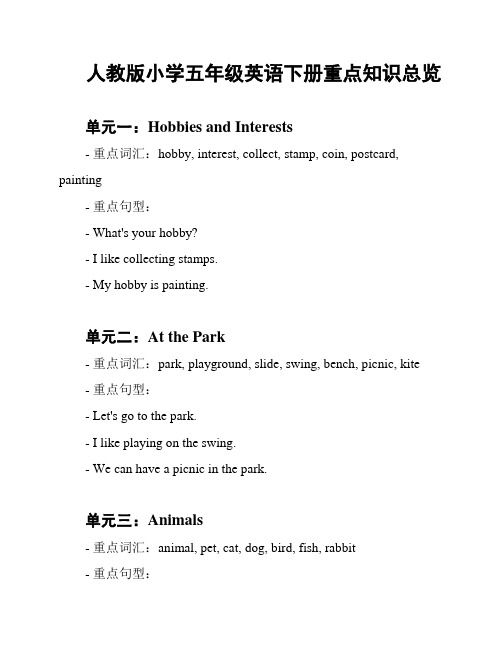
人教版小学五年级英语下册重点知识总览单元一:Hobbies and Interests- 重点词汇:hobby, interest, collect, stamp, coin, postcard, painting- 重点句型:- What's your hobby?- I like collecting stamps.- My hobby is painting.单元二:At the Park- 重点词汇:park, playground, slide, swing, bench, picnic, kite- 重点句型:- Let's go to the park.- I like playing on the swing.- We can have a picnic in the park.单元三:Animals- 重点词汇:animal, pet, cat, dog, bird, fish, rabbit- 重点句型:- Do you have any pets?- I have a pet cat.- The bird is singing.单元四:Food and Drinks- 重点词汇:food, drink, apple, banana, orange, milk, water- 重点句型:- What's your favorite food?- I like eating apples.- Can I have some water?单元五:Weather and Seasons- 重点词汇:weather, sunny, cloudy, rainy, snowy, spring, summer, autumn, winter- 重点句型:- What's the weather like today?- It's sunny and warm.- I like playing in the snow.单元六:My Family- 重点词汇:family, father, mother, brother, sister, grandfather, grandmother- 重点句型:- How many people are there in your family?- I have one brother and one sister.- My grandparents live with us.单元七:School Life- 重点词汇:school, classroom, teacher, student, desk, chair, book, pen- 重点句型:- What's your favorite subject?- I like English.- We study at school.单元八:Sports and Activities- 重点词汇:sports, activity, football, basketball, volleyball, swimming, dancing- 重点句型:- Do you like sports?- Yes, I like playing football.- Let's go swimming together.单元九:Transportation- 重点词汇:transportation, car, bus, bicycle, taxi, train, subway - 重点句型:- How do you go to school?- I go to school by bus.- I want to take a train.单元十:Occupations- 重点词汇:occupation, doctor, teacher, nurse, firefighter, policeman, musician- 重点句型:- What do you want to be in the future?- I want to be a doctor.- My mom is a teacher.以上是人教版小学五年级英语下册的重点知识总览,希望对你有帮助!。
人教版小学五年级英语下册重点知识归类
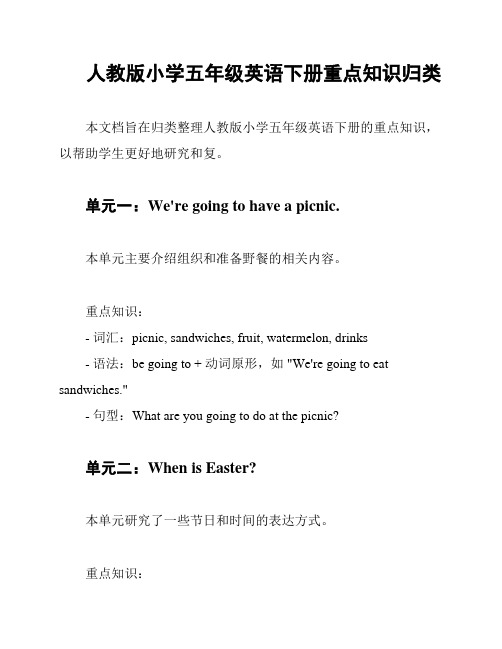
人教版小学五年级英语下册重点知识归类本文档旨在归类整理人教版小学五年级英语下册的重点知识,以帮助学生更好地研究和复。
单元一:We're going to have a picnic.本单元主要介绍组织和准备野餐的相关内容。
重点知识:- 词汇:picnic, sandwiches, fruit, watermelon, drinks- 语法:be going to + 动词原形,如 "We're going to eat sandwiches."- 句型:What are you going to do at the picnic?单元二:When is Easter?本单元研究了一些节日和时间的表达方式。
重点知识:- 词汇:Easter, Christmas, New Year's Day, Halloween- 语法:疑问词when和具体时间的表达,如 "When is Easter?"- 句型:When is Christmas?单元三:Do you want to go to a movie?本单元研究了表达意愿和邀请的相关内容。
重点知识:- 词汇:movie, park, zoo, museum, swimming pool- 语法:do you want to + 动词原形,如 "Do you want to go to a movie?"- 句型:Do you want to go to the park?单元四:Can you swim?本单元介绍了一些体育运动和能力的表达方式。
重点知识:- 词汇:swim, run, jump, skate, ride- 语法:can + 动词原形,如 "Can you swim?"- 句型:Can you ride a bike?单元五:What's the matter with you?本单元主要研究了描述身体状况和感受的表达方式。
人教版PEP小学英语五年级下册知识点汇总(最新)
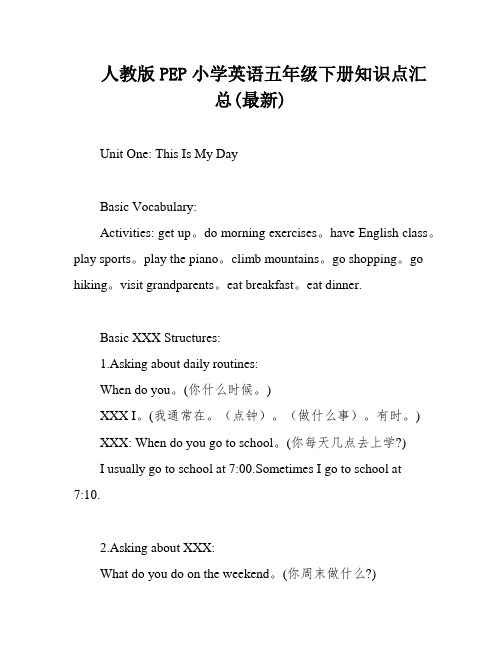
人教版PEP小学英语五年级下册知识点汇总(最新)Unit One: This Is My DayBasic Vocabulary:Activities: get up。
do morning exercises。
have English class。
play sports。
play the piano。
climb mountains。
go shopping。
go hiking。
visit grandparents。
eat breakfast。
eat dinner.Basic XXX Structures:1.Asking about daily routines:When do you。
(你什么时候。
)XXX I。
(我通常在。
(点钟)。
(做什么事)。
有时。
)XXX: When do you go to school。
(你每天几点去上学?)I usually go to school at 7:00.Sometimes I go to school at7:10.2.Asking about XXX:What do you do on the weekend。
(你周末做什么?)XXX I。
(我通常/经常。
有时。
)XXX: What do you do on the weekend?I often play XXX I go shopping with my mom.3.Introducing one's own habits:Every weekend。
I go hiking。
(我每个周末远足。
)Every day。
I do my homework at 8:00 in the evening。
(我每天晚上8点做作业。
)4.Asking XXX:What do you do。
(你是干什么的?)Time:morning。
afternoon。
evening。
noon。
at night。
6:00.on Sunday。
人教精通版五年级英语下册全册知识点总结

人教精通版五年级英语下册全册知识点总结知识点总结Unit 1 Welcome to our school!【词汇】library 图书馆borrow (向某人、从某人)借borrow books 借书meeting room 会议室have a meeting 开会welcome 欢迎meet 相遇;开会our 我们的science lab 科学实验室science lesson 科学课language lab 语言实验室English lesson 英语课we 我们have 有all 所有;全部like 喜欢very much 非常;很art club 美术(艺术)俱乐部paint a picture (用颜料)绘画music club 音乐俱乐部play the piano 弹钢琴many 许多music 音乐way 路;道路please 请also 也;同样【句型】1. We\\\\\\\\\'ll show you around our school. 我们会带你参观我们学校。
2. Look! This is our library. 看!这是我们的图书馆。
3. —Do you often come to the library?你经常去图书馆吗?—Yes. We often borrow books from the library.是的。
我们经常从图书馆借书。
4. This way, please. This is our meeting room.这边请。
这是我们的会议室。
5. Welcome to our school. 欢迎来到我们学校。
6. —How many science lessons do you have in a week?你们一周有多少实验课?—We have two. 两节。
7. —Do you like English? —Yes. We all like it.你喜欢英语吗?喜欢。
人教新起点 五年级英语下册知识点汇总

人教新起点五年级下册知识点汇总Unit 1 Keep Healthy(保持健康)一、单元词汇(小朋友,千里之行,始于单词哦!)too much 太多candy 糖果go to bed 去睡;就寝early 早exercise 锻炼tired 困倦的;疲倦的drink 喝;饮before 在......之前dirty 肮脏的always 总是stomachache 胃疼headache 头疼toothache 牙痛a lot of 大量;许多sleepy 困的;欲睡的subject 学科mark 分数advice 建议more 更多的二、单元句型(小朋友,学会了这些句子,会变得更加优秀哦!)1.A: What's wrong? 怎么了?B: I've got a stomachache. 我肚子疼。
2.A: I often have stomachaches. What should I do?我经常肚子疼。
我应该怎么办?B: You should drink some water. 你应该喝些水。
3.Here you are. 给你。
4.A: Do you eat a lot of candy? 你吃了很多糖吗?B: Yes, I eat some after every class. 是的,我每节课后都吃很多。
5.You shouldn't eat too much candy. 你不该吃太多糖。
6.A: Do you wash your hands before eating? 你饭前洗手了吗?B: Not always. 不总洗。
7.You shouldn't eat with dirty hands. 你不该用脏手吃饭。
8.You should always wash your hands before eating.你应该坚持饭前洗手。
9.I always feel tired and sleepy. 我总觉得很累很困。
(完整版)人教版PEP五年级下册英语知识点复习总结
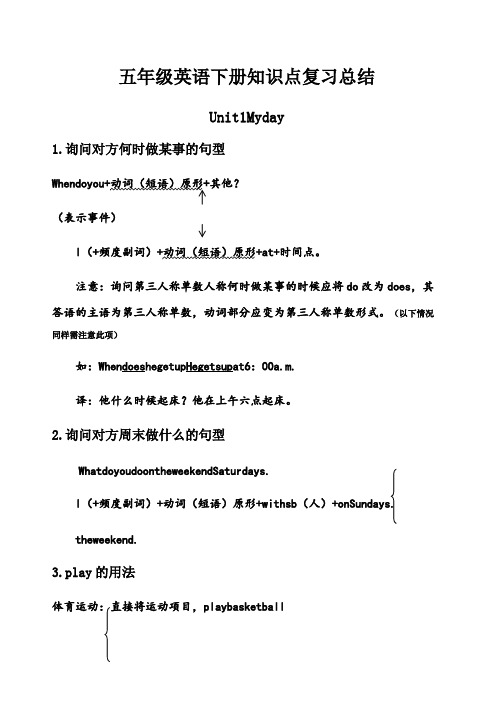
五年级英语下册知识点复习总结
Unit1Myday
1.询问对方何时做某事的句型
Whendoyou+动词(短语)原形+其他? (表示事件)
I(+频度副词)+动词(短语)原形+at+时间点。 注意:询问第三人称单数人称何时做某事的时候应将 do 改为 does,其 答语的主语为第三人称单数,动词部分应变为第三人称单数形式。(以下情况
同样需注意此项)
如:WhendoeshegetupHegetsupat6:00a.m. 译:他什么时候起床?他在上午六点起床。
2.询问对方周末做什么的句型
WhatdoyoudoontheweekendSaturdays. I(+频度副词)+动词(短语)原形+withsb(人)+onSundays. theweekend.
(2)在基数词后加 th:除去 first,second,third,其他基数词变序数词一般 直接在其后加 th。注意 five 与 twelve 要先把 ve 变 f,再加 th;eight 直接加 h;nine 去 e 再加 th。
(3)整十序数词以 ieth 结尾:整十位的序数词先将十位整数词尾的 y 变为 i, 再加 eth。如:twenty-twentieth。
The
注意:play-plays 因为 a 是元音 3)以 ch,sh,s,x 或 o 结尾的动词,在后面加-es; 例如 teach-teacheswash-washesdo-doesgo-goesfix-fixes
4)不规则的; 例如 have-has
5.by 的用法
人教版PEP五年级英语下册第三单元知识点、练习(含答案)

人教版PEP五年级英语下册第三单元知识点、练习(含答案)人教版PEP五年级英语下册第三单元知识点、练(含答案)Unit 3《My school calendar》要点知识【重点词汇】月份的单词:January(XXX.)一月February(Feb.)二月March(Mar.)三月April(Apr.)四月May五月June(Jun.)六月July(Jul.)七月August(Aug.)八月September (Sept.)九月October(Oct.)十月November(Nov.)十一月December(Dec.)十二月注意:1、月份的首字母一定要大写。
2、May没有缩写形式,September的缩写形式是“Sept.”,其他月份单词的缩写形式都是有单词的前三个字母加“·”构成。
3、月份的缩写形式不用在句子中,只能单独使用。
4、表示“在几月”时,要在月份单词前面加介词in,但在几月几日用on。
【常用节假日名称】New Year’s Day元旦(1.1)Tree Planting Day植树节(3.12)Easter复活节April Fool’s Day愚人节(4.1)May Day 劳动节(5.1)XXX母亲节(每年五月的第二个星期天)Children’s Day 儿童节(6.1)Father’s Day父亲节(每年六月的第三个星期天)Teachers’ Day教师节(9.10)China’s National Day国庆节(10.1)Mid-Autumn Day中秋节(阴历八月十五)Thanksgiving Day感恩节(11月第4个周四)Christmas圣诞节(12.25)summer vacation暑假winter vacation暑假【举动称号】sports XXX举动会Easterparty复生节集会school trip黉舍游览Chinesetest语文测试singingcontest歌颂竞赛birthday party华诞集会【要点语法】11.介词in、on、at的用法。
人教版-五年级下 英语Unit3知识点梳理

五下Unit 3 Asking the way【课文翻译】图①Yang Ling wants to visit Su Hai's new home.杨玲想参观苏海的新家。
Yang Ling: How do I get to your home, Su Hai?我怎么到达你家,苏海?Su Hai: You can take the metro.你可以乘地铁。
You can get on the metro at Park Station and get off at City Library Station.你可以在公园站上地铁,在城市图书馆站下地铁。
Then, walk to Moon Street.然后,走到月亮街。
There' s a bookshop on the street.My home is next to it.在那条街上有一家书店。
我家在它旁边。
Yang Ling: All right.好的。
图②Yang Ling comes out from City Library Station.杨玲从城市图书馆站出来。
She is on Sun Street.She cannot find the bookshop.她在太阳街上。
她找不到书店。
She asks a policeman for help.她向警察求助。
Yang Ling: Excuse me, how do I get to the bookshop on Moon Street?劳驾,我怎么到达月亮街的书店?Policeman: Go along this street.沿着这条街走。
Turn right at the traffic lights.在交通灯处向右转。
Then, go along Moon Street.然后,沿着月亮街走。
You can see the bookshop on your night.你能在你的右侧看到书店。
人教版五年级英语下册全册知识点总结
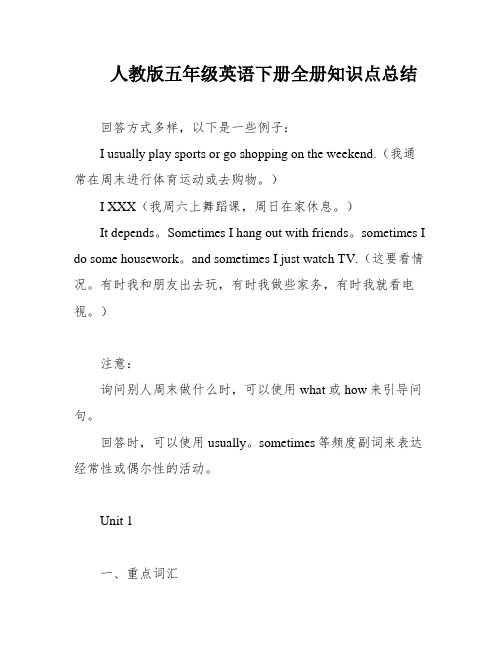
人教版五年级英语下册全册知识点总结回答方式多样,以下是一些例子:I usually play sports or go shopping on the weekend.(我通常在周末进行体育运动或去购物。
)I XXX(我周六上舞蹈课,周日在家休息。
)It depends。
Sometimes I hang out with friends。
sometimes I do some housework。
and sometimes I just watch TV.(这要看情况。
有时我和朋友出去玩,有时我做些家务,有时我就看电视。
)注意:询问别人周末做什么时,可以使用what或how来引导问句。
回答时,可以使用usually。
sometimes等频度副词来表达经常性或偶尔性的活动。
Unit 1一、重点词汇吃早餐:eat breakfast 上······课:have。
class进行体育运动:play sports做早操:do morning exercises 打扫我的房间:clean my room 去购物:go shopping舞蹈:dancing上午:a.m.通常地:usually二、其他日常活动起床:get up上床睡觉:go to bed活动,运动:exercise吃晚饭:eat XXX散步:go for a walk研究,上(课):XXX上舞蹈课:take a dancing class下午:p.m.吃午饭:eat XXX洗脸:XXX洗我的衣服:XXX看电视:watch TV打乒乓球:play ping-pong弹琵琶:play the pipa去游泳:go swimming去跑步:go running做作业:do homework练武术:do XXX踢足球:play football打篮球:play basketball三、语音cl→ [cl]:clean。
人教版五年级英语下册知识点总结

人教版五年级英语下册全册知识点Unit 1 My day一、重点词汇。
1.四会词汇:eat breakfast吃早饭 have···class 上······课 play sports 进行体育运动 exercise 活动;运动 do morning exercises做早操 eat dinner吃晚饭 clean my room 打扫我的房间 go for a walk 散步 go shopping 去买东西;购物 take学习;上(课) dancing跳舞;舞蹈 take a dancing class 上舞蹈课2. 三会词汇:when什么时候after 在(时间)后start 开始usually 通常地;惯常地Spain 西班牙late 晚;迟 a.m. 午前;上午 p.m. 午后;下午 why 为什么shop 去买东西;购物work 工作last 上一个的;刚过去的sound 听起来好像 also 还;也 busy 忙的 need 需要 play 戏剧;剧本letter 信live 居住island 岛always 总是;一直cave 山洞;洞穴go swimming 去游泳 win 获胜二、其他日常活动。
get up起床 eat lunch吃午饭 go to bed 上床睡觉wash my face洗脸 wash my clothes 洗我的衣服 watch TV看电视 play ping-pong打乒乓球 playthe pipa弹琵琶 go swimming去游泳 go running去跑步 do homework 做作业 do kung fu练武术 play football踢足球 play basketball打篮球三、频度副词。
always总是,一直(100%) usually通常(80%) often 经常(60%) sometimes(30%)有时四、疑问词。
人教版PEP小学英语五年级下册unit1至unit3知识点归纳
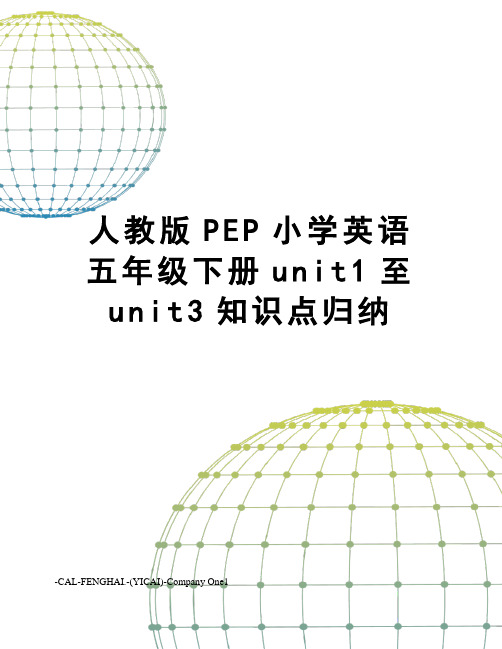
人教版P E P小学英语五年级下册u n i t1至u n i t3知识点归纳-CAL-FENGHAI.-(YICAI)-Company One1五年级下册Unit 1-3重点难点、单元单词、短语和知识点知识梳理第一单元知识点一、主要单词:do morning exercises晨练,做早操 eat breakfast吃早饭 have English class上英语课 play sports进行体育活动 eat dinner吃晚饭 eat lunch吃午饭 climb mountains爬山 go shopping购物,买东西 play the piano弹钢琴 visit grandparents看望(外)祖父母 go hiking去远足二、主要句子:When do you eat dinner你什么时候吃晚饭I eat dinner at 7:00 in the evening.我晚上七点吃晚饭。
When do you get up你什么时候起床I usually get up at 12:00 at noon.我通常在中午12点起床。
What do you do on the weekend你在周末干什么Usually I watch TV and go shopping.我通常看电视和购物。
Sometimes I visit my grandparents.有时候我去看望我的外祖父母。
I often play football.我经常踢足球。
Sometimes I go hiking.有时候我去远足。
三、同义词eat breakfast—have breakfast eat lunch—have luncheat dinner—have dinner play sports—do sports usually—often复数形式:policeman—policemen policewoman—policewomen现在分词:tell—telling三单:say—says同义句:What do you do ---What are you你是干什么的四、表示频度的副词:always总是,一直 usually通常,常常 often经常 sometimes有时候五、以复数形式出现的词组:visit grandparents plant trees介词后跟表示时间的词语时,表示在某年、某月、某个季节,某个时候(在上午,在下午,在晚上)用in;表示在某一天,在星期几用on,在具体的几点几分用at.七、too 和either的用法区别:too和either都是“也”的意思,但too用于肯定句,either用于否定句。
人教版英语五年级下册知识点总结

人教版英语五年级下册知识点总结一、词汇核心词汇学校生活:classroom, library, playground, office, restroom, schedule, lesson, homework, break, lunch家庭成员:family, father, mother, brother, sister, uncle, aunt, cousin日常活动:get up, go to bed, wash face, brush teeth, eat breakfast, do homework, watch TV, play computer games 食物与饮料:hamburger, hot dog, sandwich, pizza, cake, cookie, milk, juice, water拓展词汇学科名称:math, science, Chinese, English, PE, art, music 颜色与衣物:red, blue, yellow, green, white, black, shirt, pants, shoes, hat, socks动物与植物:cat, dog, fish, bird, rabbit, flower, tree, grass, leaf节假日与活动:birthday, Christmas, Spring Festival, summer vacation, winter vacation, party, picnic二、语法现在进行时表达正在进行的动作或状态。
be动词(am/is/are)+动词-ing形式。
例句:What are you doing? I am reading a book. They are playing football.一般现在时表达经常性的行为或状态。
主语为第三人称单数时,动词形式要发生改变。
例句:She always washes her hands before meals. He often watches TV in the evening.一般过去时表达过去某个时间发生的动作或状态。
人教版小学五年级下册英语知识点复习
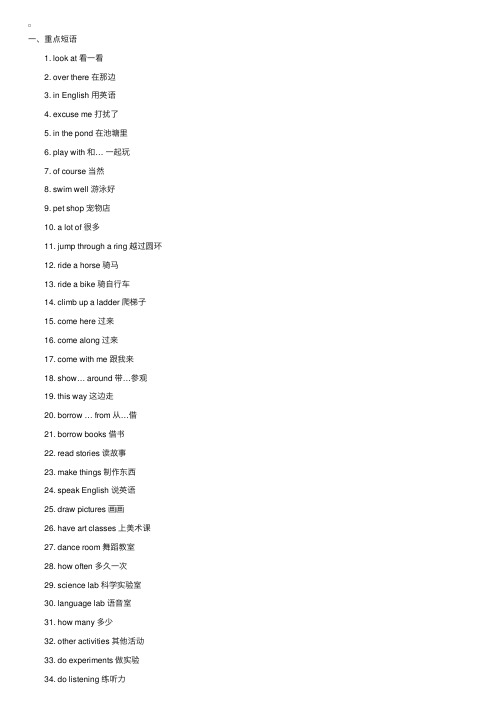
⼀、重点短语 1. look at 看⼀看 2. over there 在那边 3. in English ⽤英语 4. excuse me 打扰了 5. in the pond 在池塘⾥ 6. play with 和… ⼀起玩 7. of course 当然 8. swim well 游泳好 9. pet shop 宠物店 10. a lot of 很多 11. jump through a ring 越过圆环 12. ride a horse 骑马 13. ride a bike 骑⾃⾏车 14. climb up a ladder 爬梯⼦ 15. come here 过来 16. come along 过来 17. come with me 跟我来 18. show… around 带…参观 19. this way 这边⾛ 20. borrow … from 从…借 21. borrow books 借书 22. read stories 读故事 23. make things 制作东西 24. speak English 说英语 25. draw pictures 画画 26. have art classes 上美术课 27. dance room 舞蹈教室 28. how often 多久⼀次 29. science lab 科学实验室 30. language lab 语⾳室 31. how many 多少 32. other activities 其他活动 33. do experiments 做实验 34. do listening 练听⼒ 35. observe things 观察事物 36. do speaking 练⼝语 37. New Year’s Day 元旦 38. meeting hall 会议⼤厅 39. Children’s Day ⼉童节 40. be good at 擅长 41. be interested in 对…感兴趣 42. music club ⾳乐俱乐部 43. no one 没有⼈ 44.play the violin 拉⼩提琴 45. art club 美术俱乐部 46. come into 进⼊ 47.listen to music 听⾳乐 48. cut out 剪下 49. come from 来⾃ 50. up and down 上上下下 51. in groups 成组 52. science corner 科学⾓ 53. group work ⼩组活动 54. do project work 做项⽬制作 55. art corner 美术⾓ 56. computer corner 电脑⾓ 57.play football 踢⾜球 58. be famous for 因…闻名 59. study plants and animals 研究动植物 60. do exercises 做运动 61. on the field 在操场上 62. do printing on the paper 在纸上印刷 63. how about …怎么样? 64.go on field trips ⽥野考察 65. play volleyball 打排球 66. play basketball 打篮球 67. play hockey 打曲棍球 68. play rugby 打橄榄球 69. in the forest 在森林⾥ 70. have a look at 看⼀看 71. here you are 给你 72. how much 多少(钱) 73. a pair of ⼀双;⼀对 74. try on 试穿 75. shoe shop 鞋店 76. clothes shop 服装店 77. make a shopping list 做购物单 78. sports shop 体育⽤品商店 79. cake shop 蛋糕店 80. pay for 付钱 81. feel well 感觉好 82. see a doctor 看医⽣ 83. take good care of 好好照顾 84. have a bad cold 得了重感冒 85. have a fever 发烧 86. have a stomachache 胃疼 87. have a headache 头疼 88. have a toothache ⽛疼 89. have a cough 咳嗽 90. go to a concert 听⾳乐会 91. do maths problems 做数学题 92. go to the music club 去⾳乐俱乐部 93. have to 不得不 94. stay in bed 待在床上 95. get well 康复 96. be worried about 担⼼ 97. don’t worry 别担⼼ 98.help … with 帮助…做某事 99. in the hospital 在医院⾥ ⼆、重点短语讲解 1. play with 和…⼀起玩 play with sb.(某⼈) 和…⼀起玩 play with sth.(某物) 玩某物 e.g. Lucy and Lily are playing with their mother. Lucy and Lily are playing with their doll. 2. a lot of 很多 a lot of = lots of + 可数名词复数或不可数名词 e.g. 同义句转换 There are a lot of apples on the table. = There are ______ ______ apples on the table. (答案:lots of) 3. how often 多久⼀次 how often 是⼀个特殊疑问词,就频率提问。
- 1、下载文档前请自行甄别文档内容的完整性,平台不提供额外的编辑、内容补充、找答案等附加服务。
- 2、"仅部分预览"的文档,不可在线预览部分如存在完整性等问题,可反馈申请退款(可完整预览的文档不适用该条件!)。
- 3、如文档侵犯您的权益,请联系客服反馈,我们会尽快为您处理(人工客服工作时间:9:00-18:30)。
Unit 1 My day一、重点词汇。
1.四会词汇:eat breakfast吃早饭 have···class上······课 play sports 进行体育运动exercise 活动;运动domorning exercises做早操eat dinner吃晚饭 clean my room打扫我的房间 gofor a walk 散步goshopping去买东西;购物 take学习;上(课) dancing跳舞;舞蹈takea dancingclass 上舞蹈课2. 三会词汇:when什么时候after在(时间)后start开始usually 通常地;惯常地Spain 西班牙late 晚;迟 a.m. 午前;上午 p.m. 午后;下午 why 为什么shop 去买东西;购物work 工作l ast上一个的;刚过去的sound 听起来好像 also 还;也 busy 忙的 need 需要 play 戏剧;剧本letter信live 居住island 岛always 总是;一直cave山洞;洞穴go swimming 去游泳win 获胜二、其他日常活动。
getup起床 eatlunch吃午饭go to bed 上床睡觉wash my face洗脸 wash my clothes洗我的衣服 watch TV看电视play ping-pong打乒乓球 playthe pipa弹琵琶 goswimming去游泳go running去跑步 dohomework 做作业 do kung fu练武术 playfootball踢足球 play basketball打篮球三、频度副词。
always总是,一直(100%) usually通常(80%) often 经常(60%) sometimes(30%)有时四、疑问词。
when什么时候why 为什么五、重点句型。
1、询问别人什么时候做某事的句型及回答。
句型结构:问:When do you+动词短语原形+其他?(你/你们什么时候做某事?)答:I/We(+频度副词)+动词短语原形+at+具体时间(我/我们通常在几点做某事。
) 例:问:Whendo you gotobed?(你什么时候上床睡觉?)答:I go to bed at 9:00p.m (我晚上9点上床睡觉。
)注意:当主语是第三人称单数(he,she,it,单个人名或单数名词)时,助动词do要变成does,句型结构是:When does+主语(第三人称单数)+动词短语原形+其他?2、询问别人周末做什么的句型及回答。
句型结构:问:Whatdo youdo on theweekend?(你周末做什么?)答:I(+频度副词)+动词(短语)+其他。
例:问:What doyoudoon theweekend?(你周末做什么?)答:Iusuallyreadbooks. (我通常看书。
)注意:当主语是第三人称单数(he,she,it,单个人名或单数名词)时,助动词do要变成does,句型结构是:What does+主语(第三人称单数)+do+on the weekend?六、四会句子:When doyoufinishclass in the morning ? 你们上午的课到几点结束?Wefinish class at 1o’clock. 我们一点钟结束上午的课。
What doyoudoon the weekend ? 你周末做什么?Ioften watch TV and play ping-pong with my fathe r. 我经常看电视,也常和我爸爸一起打乒乓球。
Unit 2 My favouriteseason一、重点词汇1. 四会:spring 春天 summer 夏天 autumn秋天 winter冬天 season季节 picnic野餐 goon apicnic 去野餐pick摘;采集 pick apples摘苹果 snowman雪人 make a snowman 堆雪人 go swimming去游泳2. 三会:which哪一个best最;最高程度地snow 雪good job 做得好because 因为vacation 假期all 全;完全pink 粉色;粉色的lovely可爱的;美丽的leaf叶子(复数leaves) fall 落下;(美式)秋天paint 用颜料绘画二、其他1、形容天气的形容词hot 炎热的warm暖和的rainy多雨的windy 多风的 cold寒冷的cool凉爽的sunny晴朗的cloudy 多云的snowy下雪的2、由go构成的活动短语goswimming去游泳goshopping去购物 goboating去划船 go skating去滑冰 gohiking去远足 gofishing去钓鱼三、重点句型1、询问别人天气怎么样的句型及回答。
句型结构:问:What’sthe weather like+时间+地点?(······天气怎么样?)答:It’s+表示天气的形容词例:问:What’s the weatherlikein winter in Beijing?(北京冬天的天气怎么样)答:It’s cold and windy.(有风而且寒冷。
)2、询问别人最喜欢的季节句型及回答。
句型结构:问:Whichseason do youlikebest? (你最喜欢的季节是哪一个?)答:Ilike+季节+best或直接说季节名称。
同义句还有:What’s yourfavourite season?3、询问别人喜欢某个季节的原因的句型及回答。
句型结构:问:Why doyoulike+季节名称?或直接用“Why”来提问。
答:一般要用“because”引导的句子来说明理由,可以从天气相关的活动等方面来说。
例:问:Whydo youlikespring?(你为什么喜欢春天?)答:Because Icanflykites.(因为我能放风筝。
)问:Whydo you like summer?(你为什么喜欢夏天?) 答:Because I can go swimmingeveryday.(因为我每天都能去游泳。
)问:Whydoyoulikeautumn?(你为什么喜欢秋天?)答:Becausethe weather iscool.(因为天气凉爽。
)问:Whydo you likewinter?(你为什么喜欢冬天?)答:Because Ican make a snowman.(因为我能堆雪人。
)四、句子Whichseason do youlike best, Mike ? 迈克,你最喜欢哪个季节?Winter . 冬天。
Why ?为什么? Because I likesummervacation ! 因为我喜欢暑假!ﻫUnit 3 My school calendar一、重点词汇1.四会:January(Jan.)一月February(Feb.)二月 March(Mar.)三月 April(Apr.)四月 May五月 June(Jun.)六月July(Jul.)七月 August(Aug.)八月 September (Sept.)九月October(Oct.)十月 November(Nov.) 十一月 December(Dec.)十二月2.三会:few 不多;很少 a few一些th ing事情meet 聚会;开会 sportsmeet 运动会 Easter复活节trip 旅行 year 年plan t种植contest 比赛;竞赛the Great Wall 长城national 国家的National Day国庆日 American 美国的Thanks giving 感恩节Christmas 圣诞节holiday 假日;节日game 游戏 roll 滚动look for 寻找chocolate 巧克力bunny(用作儿语)兔子RSVP(尤用于请柬)请赐复by在......之前注意:1、月份的首字母一定要大写。
2、May没有缩写形式,September 的缩写形式是“Sept.”,其他月份单词的缩写形式都是有单词的前三个字母加“·”构成。
3、月份的缩写形式不用在句子中,只能单独使用。
4、表示“在几月”时,要在月份单词前面加介词in,但在几月几日用on。
二、常用节假日名称。
New Year’s Day元旦(1.1)Tree PlantingDay 植树节(3.12) Easter 复活节April Fool’sDay愚人节(4.1)May Day 劳动节(5.1) Mother’s Day母亲节(每年五月的第二个星期天)Children’sDay 儿童节(6.1) Father’s Day父亲节(每年六月的第三个星期天)Teachers’ Day教师节(9.10)China’s National Day国庆节(10.1)Mid-Autumn Day 中秋节(农历八月十五)ThanksgivingDay 感恩节(11月第4个周四) Christmas圣诞节(12.25)summervacation暑假 wintervaca tion寒假三、活动名称sports meet 运动会 Easter party 复活节聚会 school tri p学校旅行Chinesetest 语文测试 singingcontest歌咏比赛 birthday party 生日聚会四、介词in 、on、 at的用法。
1、in后面+上午/下午/晚上/月份/季节/年份。
如:inthe mornin g,in April,inwinter,in 2015.2、on的后面+具体的某一天。
如:onMonday,on April3rd, on Friday morning.3、at后面+具体的时间点或与其他词构成固定搭配。
如:at six o’clock, at 12:30,at noon.五、重点句型。
1、问答某个活动或节日在几月份的句型及回答。
句型结构:问:When is+活动或节日名称?答:It’s in+月份。
例:问:When is Christmas?(圣诞节在什么时候?)答:It’s inDecember.(在十二月。
)2、询问别人将要做什么的句型及回答。
句型结构:问:What will you do+其他?答:I will····=I’ll···例:问:What will you do foryour mum on Moth er’s Day?(母亲节你将为你妈妈做什么?)答:I’ll give her some flowers.(我将送给她一些花。
